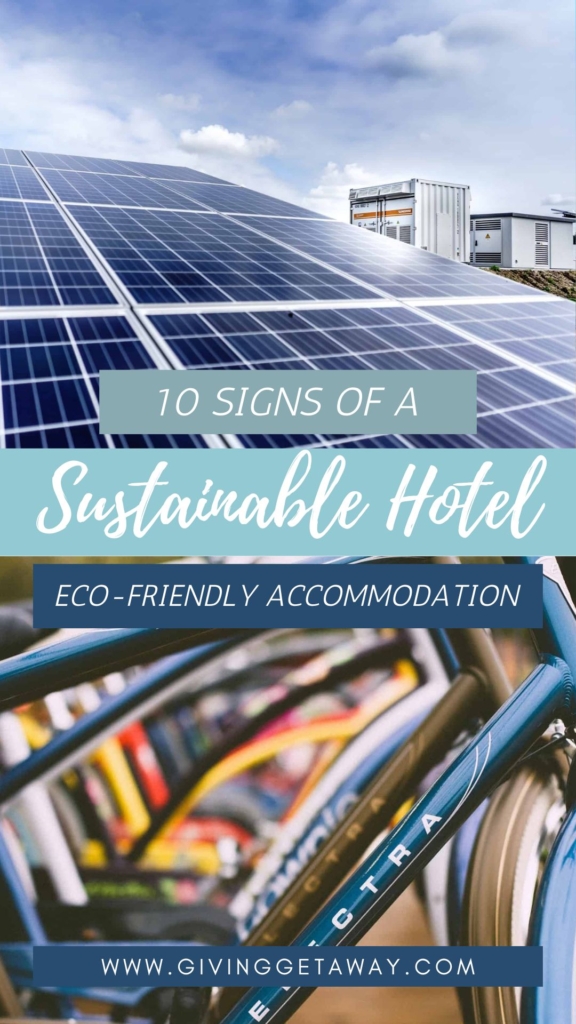| This post may contain affiliate links. Whenever you book or buy something through one of these, Giving Getaway gets a small commission, of which 100% will be donated to charity, without any extra cost to you! |
Eco-friendly accommodations have become increasingly popular among travelers who want to make sure they’re making a positive impact on the environment while on vacation. But how can you tell if your chosen hotel is truly sustainable? In this article, we’ll explore 10 signs that indicate your stay will be eco-friendly and help preserve our planet’s resources.
Sustainability travel has come a long way in recent years, with more hotels offering green initiatives such as energy conservation programs and organic food options. Whether it’s for business or pleasure, choosing eco-friendly accommodation has never been easier!
Let’s dive right into what makes a hotel truly sustainable so you can rest assured that your trip is helping protect our planet!
1) Renewable Energy
When considering eco-friendly accommodations, it’s therefore important to look for signs that the hotel you are choosing has implemented green initiatives to reduce its carbon footprint.
Renewable technology is key when evaluating whether or not a hotel is truly sustainable. Look for hotels that have installed solar panels or wind turbines on their property or purchase renewable energy credits to offset their electricity consumption. Some hotels may also use geothermal energy or hydroelectric power, depending on their location and resources.
When choosing an eco-friendly accommodation, it’s important to look for evidence of renewable energy use. Some hotels will prominently feature their renewable energy installations on their website or marketing materials, while others may require a bit more digging to uncover this information. Inquire with the hotel staff about their energy sources and ask for specifics about how they are implementing sustainable practices.
It’s worth noting that some hotels may market themselves as eco-friendly, but their use of renewable energy sources may be limited or nonexistent. To truly ensure that a hotel is prioritizing sustainability and reducing its impact on the environment, make sure to look for concrete evidence of their renewable energy use.
2) Efficient Water Use
Renewable energy is a vital part of sustainable living, but efficient water use plays an equally important role in preserving the environment. It’s essential to recognize when hotels are taking steps towards responsible and eco-friendly practices regarding water consumption. Here are some of the signs that indicate your chosen hotel is making smart decisions about its water usage:
Water harvesting can be seen as one of the most effective methods for collecting rainwater which helps reduce demand on local freshwater sources. As you explore the grounds, look out for any visible evidence of this such as rain barrels or cisterns – if they are present it highlights an effort from management to take action and conserve precious resources.
Greywater reuse is another key indicator that accommodations have implemented water conservation measures. Greywater systems recycle wastewater from bathing, laundry, and other domestic activities which enables it to be reused rather than simply being wasted by going down the drain. If you notice any special equipment installed at the property like low-flow toilets or greywater irrigation systems then it’s clear they’ve taken serious steps toward reducing their water footprint.
You can also ask the staff about how they monitor overall water consumption to get a better idea of whether your selected accommodation takes responsibility for its environmental impact seriously or not. This could involve using sensors to detect leaks, installing faucet aerators, and regulating shower time limits – all small actions that contribute significantly towards conserving natural resources over time without compromising guests’ comfort levels during their stay.
3) Sustainable Materials
When searching for eco-friendly accommodations, there are numerous signs that a hotel is committed to sustainability. One of the most important factors is the materials used throughout the property. Sustainable fabrics and chemical-free products should be readily available in rooms, lobbies, and common areas. To ensure guests are surrounded by green materials, look out for organic bedding and drapery made from sustainable fibers such as hemp or bamboo silk.
Even smaller items like towels, shower curtains, rugs, furniture upholstery, and mattress covers can have a big impact on the environment when they’re chosen with care. Look for certification labels from Greenguard Gold or Oeko-Tex Standard 100 which guarantee low emissions of volatile organic compounds (VOCs) within interior spaces. These certifications also assure that all textiles are free from potentially harmful chemicals like fire retardants and pesticides.
Wherever possible hotels should opt for natural building materials like stone floors rather than synthetic ones such as vinyl or linoleum. Natural stones not only last longer but also emit fewer VOCs into indoor air quality compared to man-made alternatives. Furthermore, recycled glass countertops can create an opulent atmosphere while helping reduce energy waste associated with mining virgin resources.
4) Recycling and Waste Reduction
Recycling and waste reduction are two of the most important aspects of eco-friendly accommodation. Hotels that practice sustainability should have a zero-waste policy in place, meaning all recyclable materials are recycled and non-recyclables are disposed of responsibly. Furthermore, many hotels now feature composting programs which turn organic waste into nutrient-rich fertilizer for gardens or landscaping.
Hotels can also go beyond traditional recycling methods by using green packagings like biodegradable containers, paper products made from recycled materials, and reusable bags for carrying items throughout the property. These small changes add up to big savings when it comes to reducing the amount of resources used at an establishment.
In addition to physical waste management strategies, guests can also look out for hotels that use digital record systems instead of printed documents as well as energy-efficient lighting fixtures. While investing in these technologies may require more initial expenditure, they often lead to long-term cost savings due to decreased electricity consumption over time.
By opting for eco-friendly accommodation with a zero waste policy, composting program, and green packaging initiatives in place, travelers are doing their part towards preserving our homes for years to come!
5) Non-Toxic Cleaning Products
Many traditional cleaners contain harsh chemicals that not only harm the environment but also our health when inhaled or absorbed through skin contact. Fortunately, many sustainable hotels have made a conscious effort to switch to non-toxic green cleaning solutions.
Beyond just reducing the environmental impact of their cleaning routine, some hotels even go further by offering alternative means of keeping their rooms spotless. For example, UV light technology is becoming increasingly popular with hoteliers looking to rid their properties of germs without using any harmful chemical compounds. This type of cleaning solution ensures guests stay in an environment free from allergens and other unpleasant residues while still being gentle on the planet.
Some establishments may use steam cleaners instead of conventional mops and buckets as this method uses significantly less water than traditional mopping techniques. Not only does it reduce water consumption, but it also effectively kills bacteria that would otherwise require strong chemical disinfectants. Additionally, utilizing microfiber cloths rather than paper towels helps cut down on unnecessary waste production—a small change that makes a big difference in achieving sustainability goals!
6) Green Transportation
Another important aspect of sustainable hotels is their approach to transportation. Green transportation options can include providing bicycles or electric vehicles for guests to use, offering shuttle services that run on alternative fuels like biodiesel or natural gas, and encouraging public transportation or walking through convenient access to nearby transit options.
Look for hotels that offer eco-friendly transportation alternatives or promote sustainable transportation practices. For example, some hotels may have bike rental programs or provide free shuttles to nearby public transportation hubs. Others may offer discounts for guests who arrive by public transportation or have electric vehicle charging stations on site.
By prioritizing green transportation options, hotels can help reduce carbon emissions from guest travel, improve air quality, and ease traffic congestion in the surrounding area. So when you’re looking for eco-friendly accommodation, be sure to consider their approach to transportation and choose a hotel that aligns with your values.
7) Energy-Efficient Lighting
When considering energy-efficient lighting, it is important to look for hotels that have committed to sustainability. When visiting the hotel, take note of the type of lighting technology they use and whether they conduct regular energy audits. LED bulbs are becoming increasingly popular in eco-friendly accommodations because they last longer than traditional lightbulbs and consume less electricity. Ask if the hotel has invested in these eco-friendly bulbs as part of their efforts to reduce wasted energy.
It may also be worth checking how many lights are on at any one time during your stay. Many sustainable hotels offer guests control over their room’s lighting via apps or voice commands, which can help save energy when not in use. If this isn’t available, ask staff about their policies regarding turning off unnecessary lights when leaving a room – always an easy way to contribute towards a more sustainable environment!
Lighting controls should also extend beyond individual rooms and into public areas such as lobbies and common spaces. Look out for motion sensors that turn off lights automatically after someone leaves the area – another great way to conserve energy without sacrificing comfort or convenience. Smart thermostats could also be present throughout the hotel, allowing you to adjust temperatures with ease while still staying cool inside (or warm!).
8) Locally Sourced Food
Sustainable agriculture is key to reducing carbon footprints and supporting local farmers in the region. Not only does this provide fresher food with more flavor than mass-produced goods from elsewhere, but it also shows that the hotel has embraced sustainability and is committed to giving back to its community.
Regional cuisine often relies on traditional recipes that have been passed down through generations – something you can appreciate when you’re looking for an authentic experience while away from home.
The chefs working at many eco-friendly hotels will be familiar with regional produce and are likely to have relationships with nearby farms or fisheries where they source their ingredients. This helps ensure quality control as well as providing guests with delicious dishes made using fresh, seasonal products. Cooking with these types of ingredients also reduces waste – unlike pre-packaged meals which tend to contain preservatives and additives that require careful disposal once eaten.
Eco-minded visitors should take note of what’s being served up in the dining room. Many green accommodations feature menus showcasing dishes created using locally sourced seafood, vegetables, fruits, grains, and other items grown close by – all designed to highlight the flavors of the area while minimizing environmental impact. Ethically produced meat may also be available if it’s within reach – another sign that your hostelry is truly dedicated to responsible tourism practices.
9) Environmental Education
Many sustainable hotels prioritize environmental education and awareness as a way to promote responsible travel and encourage guests to make more sustainable choices. This can include providing educational materials in guest rooms, hosting workshops or events related to environmental sustainability, or partnering with local organizations that work on conservation or sustainability issues.
Look for hotels that actively promote environmental education and sustainability. Some hotels may offer guided tours or experiences that highlight local ecosystems or conservation efforts. Others may have on-site educational displays or interactive exhibits that teach guests about the local environment and how they can reduce their impact on it.
By incorporating environmental education into their operations, hotels can help to raise awareness about sustainability issues and inspire guests to make more eco-friendly choices both during their stay and beyond. So if you’re passionate about sustainable travel, look for hotels that prioritize environmental education and consider taking part in any educational opportunities they offer.
10) Certifications and Awards
When researching eco-friendly accommodations, it’s important to look for certifications and awards that prove the hotel is truly committed to sustainability. Look for organic certification or another type of eco-labeling program. These indicate a business has been certified by an independent third party as adhering to best practices in sustainable operations. Additionally, you can also research if the hotel participates in carbon offset programs. This helps reduce their overall contribution to climate change.
Another thing to consider when choosing green lodgings is whether they have achieved LEED or BREEAM certification with regard to energy efficiency, construction materials, and water conservation measures. Hotels may be able to use this status as a marketing tool—but more importantly, such certifications demonstrate commitment from management and staff alike toward protecting the environment on an ongoing basis.
Also, don’t forget about local initiatives. Does the hotel recycle? Do they source food locally? Are there any projects in place that support wildlife protection or community education around environmental issues? The answers will give you insight into how much effort the organization puts into living sustainably beyond simple checkboxes on a form.
Conclusion
Choosing eco-friendly accommodations is an important step towards responsible travel and reducing your impact on the environment. By looking for these 10 signs of a sustainable hotel – from renewable energy to green transportation to environmental education – you can make more informed choices about where you stay and support businesses that prioritize sustainability.
While no hotel is perfect, by choosing accommodations that prioritize sustainability and environmental stewardship, you can make a positive impact on the world and help to promote more responsible travel practices. So next time you’re planning a trip, consider these 10 signs of a sustainable hotel and choose a place to stay that aligns with your values.
If you are now considering booking your next trip, I encourage you to consider using Giving Getaway for your travel essentials such as hotels, flights, rental cars, and more.
By booking through Giving Getaway, you’ll not only have an amazing trip, but you’ll also make a difference. 50% of the commission earned from each completed booking goes towards organizing charity events, such as the 2021 Christmas gift drive for kids and teenagers in a children’s home in Montenegro.
So, book your trip with Giving Getaway and make a positive impact while enjoying your travels!
























